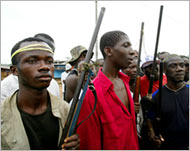Report: Migration fuels W Africa strife
Without policies to assimilate foreign workers, economic migration threatens to remain a catalyst for conflict in West Africa, a senior International Labour Organisation (ILO) official said.

Countries must take to heart the lesson of Ivory Coast, the former regional economic powerhouse knocked from its pedestal by civil war, said Patrick Taran, the senior specialist for the ILO’s migration programme said on Wednesday.
“Either states provide equitable treatment for economic migrants or they risk that the situation could deteriorate into armed conflict,” he said, speaking at a meeting here of West African nations about labour migration as a driver of integration and development.
In an effort to promote economic integration among some of the world’s poorest nations, the Economic Community of West African States (ECOWAS) has developed a “free circulation” policy for people and goods across the bloc’s 15 member states.
The policy has been endorsed by landlocked or small West African states but coolly received by the region’s giants for fear their unemployment rates will soar because of an influx of cheaper migrant labour.
“Ivorianness”
|
“If one expects social cohesion to happen automatically, they are in for the worst kind of surprise”
|
The cocoa-based economy that drove Ivory Coast‘s economic success for decades was partly built on the backs of migrants, specifically from landlocked Burkina Faso and Mali, who now make up one quarter of the country’s 17 million people.
Since the mid-1990s, they have been targeted by a xenophobic social policy known as “Ivorianness”, which denies them the opportunity to own land, become citizens or be eligible to vote, even if they were born in Ivory Coast.
A rebel uprising in September 2002, meant to draw attention to this inequality, unleashed months of civil war that continue to divide the country between north and south.
Refugees harassed
Migrant communities in the agricultural belt who once lived side by side with their indigenous neighbours suffer harassment, forcing many into refugee camps.
Others have chosen to fight back, triggering waves of communal conflict including a series of massacres in the restive west in June that left at least 100 people dead and thousands more displaced.
 |
|
Migrant communities face |
Burkinabe and Malian men were also among 40 prisoners picked up by security and defence forces on Tuesday after armed men stormed the town of Agboville, 70km north of Abidjan.
Analysts fear their implication in the attacks, which left six police officers and a forest ranger dead, will only underscore the unabated ethnic tensions in the country in the run-up to presidential polls set for 30 October.
Recognition
“I don’t imagine that the migrants came to Ivory Coast to provoke conflict; they came at the request of the government to serve as a motor for development,” Taran said.
“But if people are not being treated as human beings, with no recognition of their status and their role in economic development… if one expects social cohesion to happen automatically, they are in for the worst kind of surprise.”